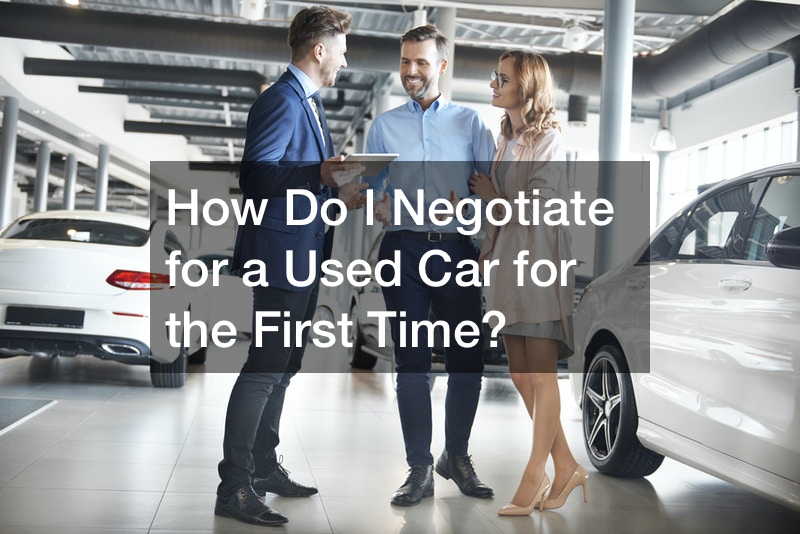
There can be many benefits to buying a used car. However, if it is your first time, there are a lot of things to consider when you’re negotiating the price and deciding if you want it. Leaving anything out can lead to you making the wrong decision for your wallet and lifestyle. So if you want to know, how do I negotiate for a used car, make sure you keep these things in mind.
Find Out the History
Before you ask how do I negotiate for a used car, it is essential that you know its history. The car’s history can impact everything from the final price to whether it is worth buying at all. For starters, how old is the car? How many owners has it had? If it has had a lot of owners, there might be a reason for that. There might be problems with it or it could have been put through a lot of use, wearing it down. Use all the resources at your disposal to find out exactly what has happened to that car and what kinds of problems it might have.
One extremely important thing to learn is whether it has been in any accidents. While collision repairs can go a long way toward making the car better, there might be some lingering problems that you need to handle. Or, in the midst of hiring a car accident attorney and dealing with the aftermath, the previous owner might have overlooked damage. If you don’t know about it when you buy the car, you may end up with unexpected repair bills.
Once you know the history, you can decide whether the car is still worth purchasing. While it might need repairs, those repairs could still be cheaper than buying a new car instead. You can also use this information to negotiate a better price for the car. Consider the price of the repairs and use that to calculate a new offer. Make sure that you get a complete, accurate history to help you when researching how do I negotiate for a used car. It can make a big difference in your negotiating power.
Does Your Insurance Change?

If you plan to drive the car, you’ll need to have car insurance. If you already have car insurance, see how it will change when you search how do I negotiate for a used car. There are many factors that go into pricing your insurance plan and the age, make, and condition of the car all come into play. If your car insurance goes up too much, is it still worth buying the car? Or does the cost cancel out the savings? Talk to your insurance company and do some comparison shopping to find out how buying it would impact the cost of your insurance.
Along with the cost, make sure that your insurance benefits won’t change too much. If your insurance company offers roadside assistance service or car towing, they should still be able to offer these things with the used car. If they don’t, keep that in mind while you look up how do I negotiate for a used car. You might be able to get some money off the asking price in order to keep you interested in buying.
Have Your Mechanic Take a Look
If you have an auto mechanic you trust, ask them to check the car over for you before you buy it. While this might cost you a little extra money, it is worth it for the assurance it provides. Even with the car’s history, you won’t know for sure that there’s nothing wrong with the car until professionals check it for you. Give the mechanic the car’s history and ask them to look at any areas of concern, as well as places where problems are common. As long as you trust your mechanic to give you an honest answer, you’ll have some more information to use as you make your decision whether or not to purchase the car.
If you don’t have a regular mechanic, you can also bring the car to an auto body repair shop in order to get it checked. Tell them your situation and ask them to inspect it for you. You can then use their report after researching how do I negotiate for a used car.
What Else Do You Have to Buy?

Sometimes the savings of buying a used car can be canceled out by the other purchases you need to make. So before you buy, ask yourself what else you have to buy in order to use the car regularly. Consider the repairs that might need to be made. Look for the average price of these repairs and add them up. Is it worth the cost? If you have to pay a 4 wheel alignment price on its own, it is probably worth buying used. The same goes for bumper repair. But if you need major repairs or part replacements, those costs could add up significantly. However, this doesn’t mean you need to back out of buying the car. Instead, this can be a part of how to negotiate for a used car. If the seller wants you to buy the car, they have the option to lower the price and make up for some of those additional costs you’ll have to pay.
You should also consider what accessories you’ll need to buy for the used car. If you are replacing a previous car, you probably have things set up in a way that is comfortable for you. Will you need to purchase anything in order to replicate that in this used car? This might be aesthetic or it might be practical. While things like bumper stickers and phone stands for your dashboard might not be expensive, they can add up as well. So make sure that you don’t forget these smaller costs when you’re searching how do I negotiate for a used car.
Keeping Your Used Car Safe
If you do end up buying the used car, you’ll need a place to store it. This will likely be a driveway, parking lot, or garage. Wherever it ends up being, it needs to be somewhere safe. Otherwise, your car will be open to damage or theft. Not only could this risk the car itself, but it can also lead to higher insurance premiums and potential repair or replacement costs. So make sure you have the means to keep your car safe. As you put your ‘how do I negotiate for a used car?’ tips into action, consider what you need first.
A garage is the safest place for your new car, but it needs to be secure. Otherwise, it might not provide any protection. Make sure that the door locks. If it doesn’t, you’ll need to buy a garage door replacement. Not doing so will leave your car vulnerable to the elements or to anybody who might want to take it. If you need a new garage door or other repairs to your space, you should keep those costs in mind as well.
You also need to consider the actions you’ll have to take in order to keep your car safe. It is important to lock your doors at night or when you park in public. If you don’t, someone could steal your car or its contents. Some places are at higher risk of theft, so if you’re in one of those places, it is essential that you keep this in mind. If there is a reason that locking this particular used car will be more difficult, bring this up as you negotiate for it. While not necessarily a deal-breaker, it could be one of many issues that might come up.
What Type of Gas Do You Need?

Most used cars run on gasoline. While you might find some used electric cars, they are not as common. So while you consider how do I negotiate for a used car, you should find out what type of gas it requires. Most will need regular gas, but not all of them. If the car has a diesel engine, you’ll need to use diesel fuel for it. Diesel can be more expensive, adding to your fuel budget and increasing the cost of operating the car. Since gas prices fluctuate, it can be difficult to tell exactly how much your gas will cost. However, you can get a general idea by looking up gas prices in your area. As you do so, make sure that diesel fuel is also available at the gas stations near you. If it isn’t, then it might not be worth purchasing a used car with a diesel engine. Keep these things in mind, they are an important part of negotiating for a used car.
How Much Is This Car Elsewhere?
When doing research on how do I negotiate for a used car, have you found what price other sellers are asking for this particular car? If the person you’re negotiating with has a price that is much higher or lower than others, there might be an important reason for this. So before you make any decisions, look up used cars with the same year, make, and model to see how expensive they are. There are resources available online to show you what the average cost should be, as well as what other prices are currently being asked for.
There are many reasons why the asking price of this used car might be lower than others like it. For instance, it might have a higher amount of damage, requiring you to spend more money on repairs. It could also have higher mileage, making it more susceptible to future damage. Or the owner might be trying to sell it quickly. This is why it is important to get a history of the car and its true condition. Otherwise, the costs can build up rapidly. Even if the car is cheaper than others, it is still a good idea to negotiate for a used car in this situation.
If the cost of the car is higher than others, there might be a reason for it. It might have lower mileage or be in excellent condition. In this case, it might be old, but it is less susceptible to damage. However, you need the car’s history in order to prove this. There is also the possibility that the owner is trying to get as much money as possible. In this case, it is essential that you negotiate for the used car or you will end up spending much more money than you want to.
Walk Away If You Have To
Don’t be afraid to walk away if negotiations don’t go the way you want them to. The discussions don’t need to get ugly or personal, keep it light and strictly business. If you add up the costs of ownership and decide that the sale is only possible if you are able to get the price down to a particular level, stick to that decision. You might have some wiggle room, but ultimately you are the one who is going to have to pay all of the costs involved with the car. Be willing to work with the seller, but don’t cave because it seems like you won’t get the car. There will be other cars. This is all part of negotiating for a used car.

Negotiating for a used car is intimidating, especially the first time you do so. However, there are ways to make it easier. Prepare yourself by considering all of the things listed here. As long as you know the history, potential repairs, and cost of maintenance and fuel, you’ll be able to calculate how much money it will cost to own the car in question. Use this information as you negotiate with the seller for a final asking price. If you are calm, collected, and use all the information available to you, you are much more likely to be successful in your negotiations.




